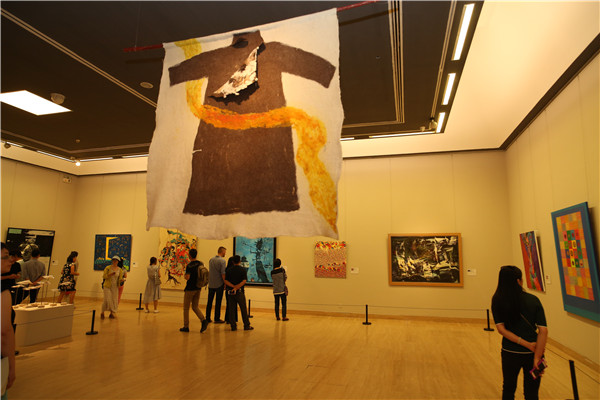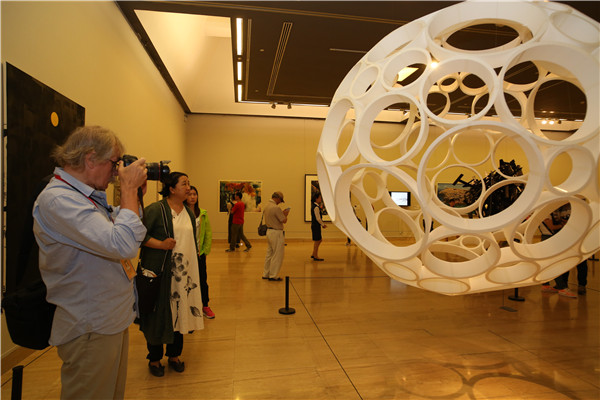Giving modern art a push
The ongoing Beijing International Art Biennale features paintings, sculptures and installations from more than 100 countries.
|
Visitors attend the ongoing Beijing International Art Biennale that features more than 600 paintings, sculptures and installations from more than 100 countries. [Photo provided to China Daily] |
Bat-Erdene Damdin-suren, an artist from Mongolia, is participating in the seventh edition of Beijing International Art Biennale with an installation called "Silk," a tribute to the enduring influences of Silk Road and Maritime Silk Road as well as wider communication among different civilizations.
Speaking about his passion, he says: "Being an artist is a hard job. But it is the best job for me."
The ongoing event features more than 600 paintings, sculptures and installations at the National Art Museum of China in Beijing, with artists from more than 100 countries.
The biennial was launched in 2003 by the China Artists Association. And Damdinsuren says he first showed his work at the third edition of the event-a metal sculpture depicting horses moving in a circle. But he did not attend that event.
"Horses used to be the daily mode of transportation for Mongolians. But these day they are just animals," he says, adding that the work examined the connection between the past and the future.
Damdinsuren works a lot with metal. He says he collects metal objects and transforms them into artworks.
In "Silk," he features a red cross made up of two 4-meter-long silk strips on the ground. Then, dozens of metal mousetraps are placed on it, in the formation of four arrows, and they all point to the model of marmot that stands at the intersection of the cross.
Damdinsuren says the red cross is to remind people of peace, while the mousetraps and the marmot indicate conflicts.
|
Visitors attend the ongoing Beijing International Art Biennale that features more than 600 paintings, sculptures and installations from more than 100 countries. [Photo provided to China Daily] |
He says that when he produced the work, he envisaged a situation where people who toiled along the ancient Silk Road faced dangers and misunderstandings when trying to link the East and the West.
Damdinsuren also says that there is another level of meaning in his work. "The marmot represents any animal that is being slaughtered and dying out because of men's lust for money. Nature should not fall victim to the expansion of human activities."
Some other works on show review traditions being threatened by a commercial culture that has been prompted by globalization.
In his oil painting "Exchange," Indonesian artist I Putu Edy Asmara depicts a snail that has a man's face, and with an empty red soda can as its shell, while its old coiled shell is abandoned on the side.
Asmara says that easily accessible digital networks are giving a boost to the exchange between people living in different corners of the world.
He says that while pop and commercial cultures are widely spread, traditional cultures are less favored by people, especially the youth.
"The situation now is unlike that of the Silk Road that promoted the intersection of different cultures but didn't make local cultures extinct," he says.
"Technology unites people but should not unify us. It's still important for people to have their own lifestyles and to remain distinctive."
|
Visitors attend the ongoing Beijing International Art Biennale that features more than 600 paintings, sculptures and installations from more than 100 countries. [Photo provided to China Daily] |
Diversity has been at the heart of the BIAB for the past 15 years. And it is committed to demonstrating not only the variety of artistic creation but also different voices, especially those from less-developed areas, says Xu Li, vice-chairman of the China Artists Association.
BIAB cares for artists who need international exposure, he says.
Damdinsuren hails from a family of artists. His two daughters are artists, too.
He says he has exhibited in Australia, South Korea and Europe and he hopes that more Mongolian artists can show their works globally, so that art can be a profession with good prospects for young people and their families.
For Asmara, this is his fourth BIAB having first exhibited in 2008.
The 35-year-old from Bali says that although Indonesia has in recent years witnessed a boom in its art scene, artists still find it difficult to find collectors for their works.
He says exhibitions like the BIAB bring more attention to Indonesian art.


